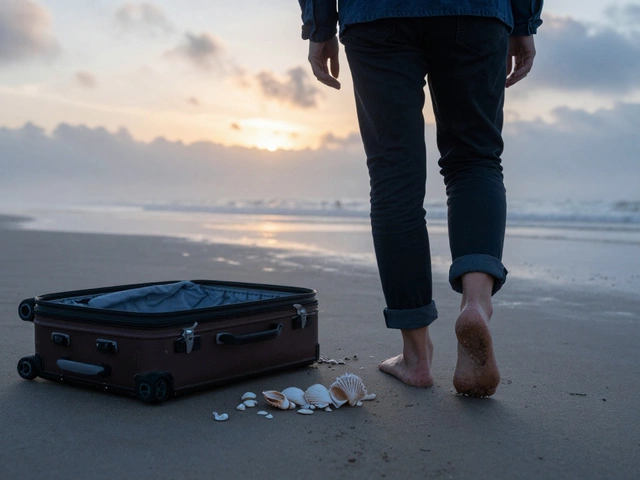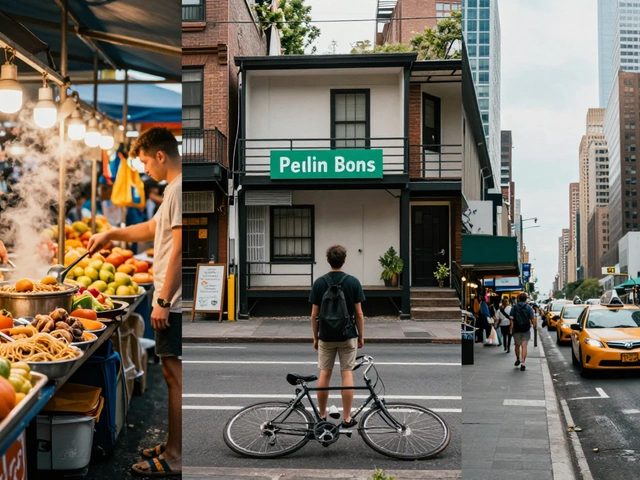Ever felt that itch to just book a flight immediately after spotting a flash sale—or realized you could snag a dreamy Airbnb late at night on your phone? Not every travel adventure needs a middleman. While travel agents bring tons of value, there are also moments when their services add little except an extra step (and sometimes some extra fees). Travel has changed fast since the 2010s: cheap flights pop up out of nowhere, hotels drop rates suddenly, and apps let you unlock adventure with a swipe. Why get someone else involved if you don’t need to? Let’s talk honestly about when you should trust yourself to hit ‘book’ without waiting for anyone else to get back to your email.
Knowing When a Travel Agent Isn’t the Best Pick
Let’s get real: travel agents aren’t one-size-fits-all problem solvers. If you’re planning a city break in Paris or just popping over to Vegas for a long weekend, there’s a good chance a travel agent isn’t necessary. These days, you can research and reserve nearly everything using your phone. Web tools like Google Flights, Skyscanner, and Hopper keep getting smarter. They compare prices, show you deal histories, and even warn when prices are about to spike. Expedia, Booking.com, and Airbnb let you read real user reviews, see actual room photos, and grab quick discounts. If you relish the hunt for bargains or love micromanaging your own plans—maybe you want the cutest boutique hotel, not the chain where travel agents get extra perks—the do-it-yourself approach can be both fun and more flexible.
Think about it: For short, direct trips or domestic travel, travel agents usually don’t snag you special rates you can’t find yourself. Airlines in the US rarely offer agents secret fares for coach passengers nowadays; those deals have mostly vanished since about 2008. And if you’re only booking a round-trip flight and a few nights at one hotel, a travel agent often can’t add much value. Plus, when you do it solo, you avoid agency fees, and you don’t need to wait for back-and-forth emails or calls if something changes or you spot a better deal late at night. That immediacy can mean the difference between grabbing a flash sale seat and missing out. For tech-savvy folks comfortable comparing options, the freedom is almost thrilling.
Then, there’s the matter of control. Planning on-the-go adventures, changing dates, or tweaking your itinerary last-minute? Using a travel agent can lock you into rigid cancellation policies or agency restrictions. DIY booking sites usually let you change or cancel directly—sometimes with the click of a button—especially if you’ve picked flexible rates. Apps like Airbnb and HotelTonight offer instant support if you need help on the ground, so you won’t have to navigate an agency phone tree while you’re stuck in an airport, either.
Don’t forget about privacy, too. Some people prefer not to share every vacation detail with a third party, especially when booking more unusual stays, like a treehouse in Costa Rica or glamping in Mongolia. With DIY platforms, you can go straight to the source, message your host, and ask those quirky questions. Sometimes, that personal touch goes a long way and can even unlock local perks you wouldn’t get through a travel agent’s standard package.
All this adds up to one clear message: If your plans are straightforward, uncluttered, easily managed—even more adventurous—the DIY route offers savings, speed, and freedom. For these trips, a travel agent might just slow you down.

Where DIY Travel Wins Every Time
Ready for the nitty-gritty? Let’s break down the real-world scenarios when booking yourself has almost unbeatable advantages. First up: last-minute travel. Snagging ultra-cheap flights or rooms when plans suddenly change—maybe a friend is getting married or you’re chasing a weather window for the Northern Lights—usually means snapping up deals before anyone else. Travel agents can’t keep up with the speed of flash sales. Sites like Secret Flying or The Flight Deal push out alerts fast, but you have to jump on them quick. If you tried to loop in an agent, the deal would likely vanish before they respond.
Next, there’s the rise of niche and alternative accommodations. Platforms like Airbnb, VRBO, and Booking.com put you face-to-face with property owners. Searching for vintage airstreams in Joshua Tree, traditional riads in Marrakesh, or a yurt on a Scottish hillside? These properties often aren’t listed with agents—or if they are, you’ll pay more and might miss out on special host offers. You can chat with hosts, read true guest reviews, browse more photos, and secure your booking in minutes. If you want to travel light and trust your instincts—or just want to keep everything in your pocket with an app—DIY is the champion.
Another thing: Airline apps and direct hotel sites often offer bonus perks for booking direct. We’re talking free WiFi, late checkout, welcome cocktails, or loyalty points that add up fast. Sure, agents sometimes have group deals, but those usually apply to big tours or specific partner chains. Go direct, and you’re in control: you can apply promo codes, earn points, and tweak your booking any time yourself. Booking directly sometimes even means better customer service; you call the airline or hotel directly instead of a third-party call center, so your problems get solved faster.
Flexibility is clout. Want to travel on uncertain, changing dates? Realize you’d rather stay at the beach longer or swap cities mid-trip? DIY booking makes ‘just wing it’ travel possible. Travel agents may lock you into pre-set dates or non-refundable options to get the best price. Tools like Google Flights’ price tracking or Hopper’s freeze feature let you keep an eye on fluctuating prices and swoop in when the moment’s right. If you just want the best deal for your own needs—not a cookie-cutter package—this route puts you in the driver’s seat. Spontaneity isn’t really the travel agent’s game.
Then there’s the price. Agents charge service fees, typically ranging from $25 to $100 per person (and sometimes more for luxury travel). Even if they say their service is free, they often earn commissions from hotels or tour companies—money that sometimes pushes them to suggest pricier options, not the best overall fit. And if you’re booking a quick weekend or a flexible backpacking adventure, those fees add up without giving you extra value. Here’s a quick look at the average DIY savings compared to using a travel agent, based on a 2024 survey by Consumer Traveler:
| Trip Type | Average Savings DIY (USD) |
|---|---|
| Domestic weekend getaway | $80 |
| International city break | $160 |
| Backpacker/adventure trip | $120 |
| Luxury all-inclusive resort | $25 |
Of course, when flights get canceled or things go wrong, some might say travel agents are a huge help. But for simple trips, airlines and hotels handle most rebooking and customer support directly—you just have to reach out. And travel apps are getting better at resolving problems instantly, even for itinerary changes or refunds. That’s one reason younger travelers, especially Millennials and Gen Z, are skipping agents more than ever: 63% of travelers under 40 reported using travel agents rarely or never in 2024, up from 52% in 2020.
Want to maximize travel hacking? Booking yourself lets you stack credit card promos, exploit frequent flyer programs, and score quirky local deals. Many agents won’t handle points bookings, and some sites won’t let agents touch your account. For travel hackers, booking direct and DIY is the golden rule.

Smart Tips and Honest Pitfalls: DIY Booking vs. Agents
The DIY route isn’t trouble-free, and it makes sense to prepare so your dream trip doesn’t hit a snag. Here’s where an agent’s experience can sometimes save you—but if you know the pitfalls, you can usually fix things yourself.
- Read the Fine Print. Not all deals are equal. Discount sites might show wild bargains, but double-check cancellation and change rules. Flexible rates are worth the tiny extra spend if plans are uncertain.
- Watch out for third-party site drawbacks. While Booking.com and Expedia offer plenty of choice, sometimes hotels give priority to guests who book direct—like better rooms, earlier check-in, or faster help if your stay goes sideways. Cross-reference before clicking ‘buy.’
- Keep everything organized. Direct bookings mean more confirmation emails, more logins, and more details to juggle. Use a travel app like TripIt or Kayak to keep reservations in one place so nothing gets lost, especially on busy trips.
- Payment safety and scams. Stick to major, trusted websites. If a price looks unreal, do a quick search for reviews and scam alerts. And always pay with a credit card for better fraud protection.
- Stay on top of travel updates. With no agent watching your back, it’s on you to check for flight time changes, strike news, or local disruptions. Sign up for airline & hotel alerts, and check government travel advisories for your destination.
- Explore loyalty and rewards yourself. Sometimes booking direct unlocks elite status perks and room upgrades you won’t get via a third party—even when the price looks the same.
Still not sure? Here’s a quick cheat-sheet to see which route matches your vibe:
| Scenario | DIY Booking | Travel Agent |
|---|---|---|
| Simple flight+hotel, familiar destination | ✓ | |
| Last-minute trip | ✓ | |
| Complex tour/safari, special access needed | ✓ | |
| Backpacker style, flexible dates/routes | ✓ | |
| Big group, weddings, or complicated logistics | ✓ | |
| Points/miles hacking | ✓ |
At the end of the day, you’re the expert on your comfort level and adventure style. If you love chasing the best deal and having control—or your trip is simple—a travel agent may only slow you down. Use agents for the truly tangled itineraries, but whenever your trip is clear and you feel confident, book it yourself. You might surprise yourself with just how easy, fun, and freeing it is. Every tool you need is right at your fingertips.






